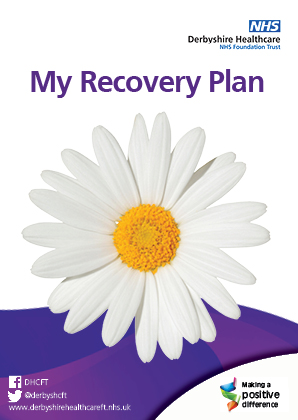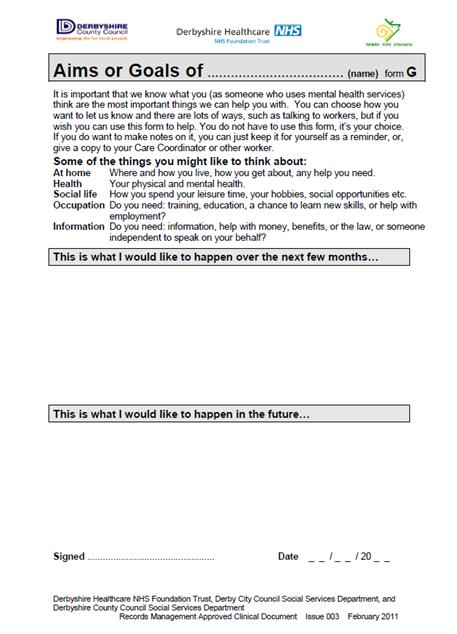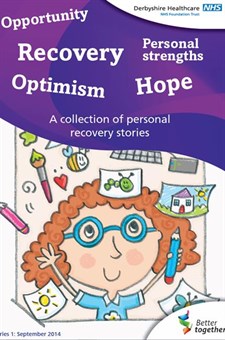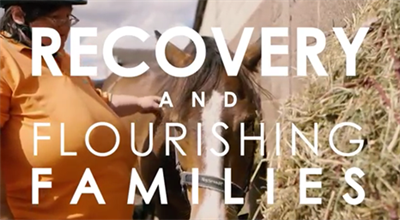We want to work with you to help you make sure that your health and wellbeing is as good as it can be. We are committed to a recovery and wellbeing-focused approach to services, which aims to support people to fulfil their potential.
In mental health, recovery does not always refer to the process of complete recovery from a mental health problem in the way that we may recover from a physical health problem. For many people, the concept of recovery is about taking and staying in control of their life despite experiencing a mental health problem.
Professionals in the mental health sector have referred to the “recovery model” to describe this way of thinking. We are not prescribing a model for “recovery” but we do want to make sure that as someone involved in our services, you have hope-inspiring relationships and opportunities to do things of value to you, you pursue ambitions and participate in your community as an equal, and you gain and keep control of your life and the challenges you face. In other words, you become an expert in your own self-care.
Putting recovery into action means focusing care on supporting recovery and building up resilience for dealing with mental health problems, not just on treating or managing their symptoms.
There is no single definition of the concept of recovery for people with mental health problems, but the guiding principle is the belief that it is possible for someone to regain a meaningful life, despite mental illness.
Components of the process of recovery:
- Finding and maintaining hope – believing in oneself, having a sense of personal agency and being optimistic about the future
- Re-establishment of a positive identity – finding a new identity which incorporates illness, but retains a core, positive sense of self
- Building a meaningful life – making sense of illness, finding a meaning in life despite illness, being engaged in life
- Taking responsibility and control – feeling in control of illness and in control of life.
(after Andresen, Oades & Caputi, 2003 Making Recovery a Reality, Sainsbury 2008)
Below you can find some helpful tools, tips and information.
 My Recovery Plan is a booklet designed and co-produced by service users, clinical staff and carers for Derbyshire Healthcare Foundation Trust to provide a pocket-sized Wellness Recovery Plan. This plan takes you through identifying the daily activities that keep you well. It also allows you to recognise your triggers and early signs when things start to go wrong and steers you towards actions you can take to keep safe. If you need any support to work through this with someone you can discuss this with your worker. You can share this with your care team if you wish.
My Recovery Plan is a booklet designed and co-produced by service users, clinical staff and carers for Derbyshire Healthcare Foundation Trust to provide a pocket-sized Wellness Recovery Plan. This plan takes you through identifying the daily activities that keep you well. It also allows you to recognise your triggers and early signs when things start to go wrong and steers you towards actions you can take to keep safe. If you need any support to work through this with someone you can discuss this with your worker. You can share this with your care team if you wish.
The Wellness Recovery Action Plan® or WRAP®, is a self-designed prevention and wellness process that anyone can use to get well, stay well and make their life the way they want it to be. It was developed in 1997 by a group of people who were searching for ways to overcome their own mental health issues and move on to fulfilling their life dreams and goals. It is now used extensively by people in all kinds of circumstances, and by health care and mental health systems all over the world to address all kinds of physical, mental health and life issues.
Click here to find out more about WRAP Planning
WRAP may help you:
- Discover your own simple, safe Wellness Tools
- Develop a list of things to do every day to stay as well as possible
- Identify upsetting events, early warning signs and signs that things have got much worse and, using Wellness Tools, develop action plans for responding at these times
- Move through the process of developing a Crisis Plan or Advance Directive
- Move on to Post-Crisis Planning
Click here to find out more about Recovery and Wellbeing on the Derbyshire Healthcare website
In 2008 MHPF (National Alliance of Voluntary Sector Mental Health Providers) worked with service users to develop what is now the Mental Health Recovery Star – a key-working and outcomes measurement tool.
The Mental Health Recovery Star is designed for adults managing their mental health and recovering from mental illness. The Mental Health Recovery Star covers 10 key areas:
- Managing mental health
- Physical health and self care
- Living skills
- Social networks
- Work
- Relationships
- Addictive behaviour
- Responsibilities
- Identity and self-esteem
- Trust and hope
Visit the Mental Health Partnerships website to find out more about the Recovery Star.
You can use the Aims or Goals form to let us know (as someone who uses mental health services) what you think are the most important things we can help you with. You can choose how you want to let us know and there are lots of ways, such as talking to workers, but if you wish you can use this form to help. You do not have to use this form, it’s your choice. If you do want to make notes on it, you can just keep it for yourself as a reminder, or, give a copy to your Care Coordinator or other worker.

Click here for the Aims or Goals Form
 Click here to read Northumberland, Tyne and Wear NHS Foundation Trust self help booklets about:
Click here to read Northumberland, Tyne and Wear NHS Foundation Trust self help booklets about:
- Abuse
- Alcohol and You
- Anxiety
- Bereavement
- Controlling Anger
- Depression
- Depression and Low Mood
- Domestic Violence
- Eating Disorders
- Food for Thought
- Health Anxiety
- Hearing Voices
- Obsessions and Compulsions
- Panic
- Post Traumatic Stress
- Post Natal Depression
- Self Harm
- Shyness and Social Anxiety
- Sleeping Problems
- Stress
- Prisoner Anxiety
- Prisoner Depression and Low Mood
- Prisoner Post Traumatic Stress
See the Royal College of Psychiatrists information on Problems and Disorders, including:
- Alcohol, Drugs and Smoking
- Alzheimer's and Dementias
- Anxiety, Panic and Phobias
- Bereavement and Loss
- Bipolar Disorder
- Depression and Seasonal Affective Disorder
- Eating Problems
- Learning (Intellectual) Disabilities
- Money Problems
- Obsessive Compulsive Disorder
- Personality Disorders
- Physical, Sleep Problems and Tiredness
- Postnatal Mental Health
- Schizophrenia and Psychosis
- Self Harm
- Stress, PTSD and Trauma
- Information for Carers
Recovery means different things to each person, and everyone has a story to share, everyone can choose their own steps towards recovery. We have gathered a selection of stories which are written in the person's own narrative, reflecting the things that are of value to them, and which convey powerful messages of hope, self-determination, resilience, inclusion and choice.
"I have had time to start to recover even though at first I found it so hard to sort anything out, and CPN did not force anything on me." Service user
Read a collection of Personal Recovery Stories


